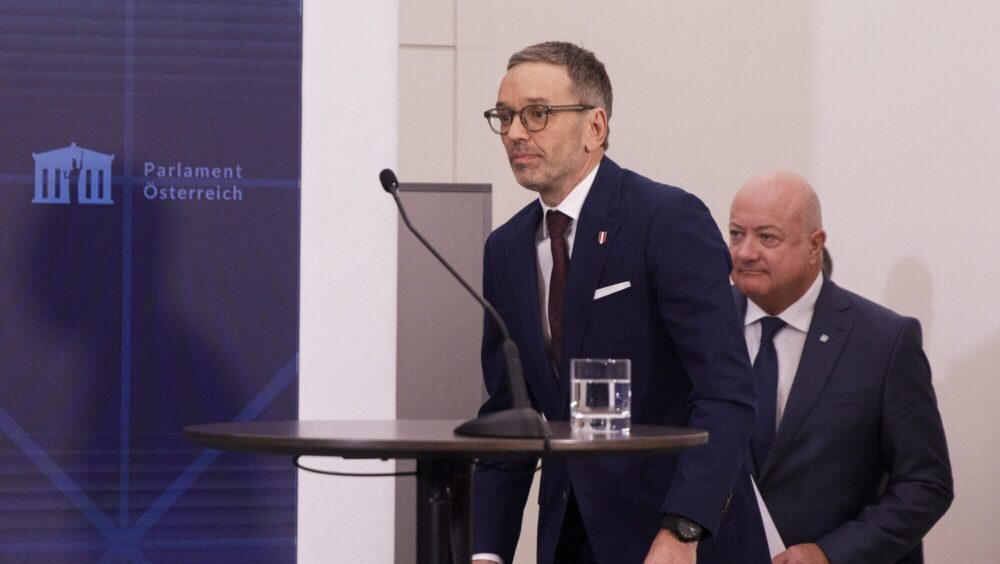
Freedom party (FPÖ) leader Herbert Kickl (L) and Austrian People’s Party (ÖVP) interim leader Christian Stocker
Alex HALADA / AFP
Media reports of a breakdown of talks between the two parties vying to form a government in Austria were exaggerated, according to Alexander Pröll, Secretary General of the centre-right People’s Party (ÖVP).
“It is quite normal that things sometimes go easier in negotiations, sometimes they are a little shaky. I think that is the essence of negotiations and that’s okay,” Pröll told Austrian publication Exxpress on Wednesday, February 5th.
The previous day Austrian media had reported that talks between the ÖVP and the right-wing Freedom Party (FPÖ) had broken down due to irreconcilable differences. This prompted FPÖ leader Herbert Kickl on Tuesday evening to state that the reports were untrue.
No, talks have not been broken off. The ÖVP is evidently holding internal deliberations. That is completely normal in negotiations. We also coordinate internally again and again. We can continue (the talks) tomorrow.
⚠️Die nächste Ente! Liebe Medien: Nein, es gibt keinen Verhandlungsabbruch. Die ÖVP stimmt sich offenbar intern ab. Das ist ganz normal in Verhandlungen. Wir stimmen uns auch immer wieder intern ab. Morgen kann es dann schon weitergehen. pic.twitter.com/22KmPykIih
— FPÖ (@FPOE_TV) February 4, 2025
The winner of last September’s elections, the FPÖ, and second-placed ÖVP have been holding talks for almost a month following the collapse of negotiations to form a three-way government between the ÖVP, the left-wing Social Democrats, and the liberal NEOS party.
FPÖ and ÖVP were quick to agree on budgetary issues, and largely agree on toughening asylum laws to stop illegal immigration into the country, but other issues, such as the distribution of ministries between the two parties, have caused a rift.
While Kickl’s party is willing to hand over a larger share of government offices to their junior partner in the future coalition—seven in total for the People’s Party compared to six for the FPÖ—Kickl wants to get hold of the most important ministries, including the finance and interior ministry. He also wants the chancellery to be in charge of constitutional and EU affairs as well as the media.
According to FPÖ negotiators, the ÖVP, which led the previous government together with the Greens, does “not qualify” to take control of the finance ministry, “if you look at the budget deficit.” Austria faces a so-called excessive deficit procedure by the EU, meaning that if it does not bring its 4% budget deficit to below 3% over the coming years, it could receive a fine.
The FPÖ, which has been consistently campaigning for decades for tough anti-immigration laws, naturally wants to be responsible for internal affairs. The eurosceptic-sovereignist party also wants to be responsible for EU affairs, as it disagrees with the current course of the European Union and the handing over of national competencies to EU institutions.
“There are differences, especially in their standpoints on the EU. However, the negotiations are unlikely to fail because of this,” political analyst Johannes Huber told AFP.
Other sticking points include FPÖ’s opposition to military aid for Ukraine and EU sanctions on Russia, as well as the party’s desire to scrap fees Austrians pay to public broadcaster ORF. The right-wing party has long claimed that the ORF is politically biased and is trying to indoctrinate viewers with its leftist agenda.
According to ÖVP’s Alexander Pröll, there are three red lines his party is unwilling to give up: the “pro-European orientation”, the “unassailable” sovereignty of Austria, and the rule of law.
The fact that the two parties share a government in five out of Austria’s nine states, may help negotiations move forward. Voters clearly want a conservative government instead of a left-liberal one: according to the latest opinion polls, the FPÖ has the support of 35% of the electorate, while the ÖVP is polling at 20%.
If the two parties are eventually able to put their differences aside and form a coalition, the new government could be in place by late February. If, on the other hand, the talks fail, the soonest the country could hold a new election would be mid-May.
